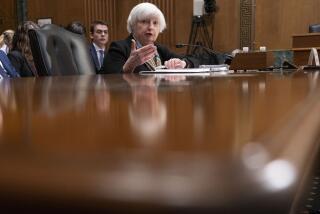Rubin Warns Against Forcing Banks to Take Bigger Asia Hit
- Share via
WASHINGTON — The Clinton administration conceded Wednesday that big international banks probably should take a bigger financial hit on the questionable loans they have made in Asia, but it warned that to force them to do so now might intensify the crisis there.
In a speech, Treasury Secretary Robert E. Rubin argued that arbitrarily requiring banks and private investors to take bigger losses could backfire by prompting them to pull their money out entirely, deepening the region’s economic distress.
He called the situation in the Asian markets “enormously complicated” and said finance ministers from countries affected by the turmoil will be certain to take up such issues when they meet this spring to discuss how to deal with any future financial crises.
For now, he said, the United States must rely on the 181-country International Monetary Fund to oversee the current global financial rescue effort for Asia, despite assertions by critics that the IMF money is being used to bail out the banks.
Rubin’s remarks were clearly designed to assuage critics in Congress who have complained that big international banks are getting away without taking major hits, even though they followed some questionable lending practices.
As a result of that backlash, the administration is facing a strong possibility that lawmakers may defeat pending legislation to boost the U.S. contribution to the IMF.
His speech, intended as a preview of testimony he is expected to give before Congress over the next several weeks, laid down a vigorous defense of the U.S. decision to lead the Asian rescue effort and to rely on the IMF to carry out the operation.
He said Washington had “worked forcefully” to help tailor the IMF’s programs to the Asian situation. “The IMF is the right institution to be at the center” of the rescue effort, he said. “There simply is no other institution capable of performing its mission.”
In an obvious concession to critics, Rubin minced no words in assessing blame for the crisis. He said foreign investors had “injected an extraordinary amount of capital into these flawed [financial] systems . . . without due weighing of the risks involved.”
“Anyone who has spent substantial time enmeshed in markets . . . appreciates that financial markets tend to go to extremes,” he said. “And when they reverse, they sometimes do so with great force.”
At the same time, he systematically dismissed criticism from lawmakers of both political parties who have contended that the United States should stay out of the Asian debacle and let the financial markets resolve the problem on their own.
“There simply is too much risk that markets alone will not resolve these problems of financial instability,” he said, “and therefore, given our stakes in Asia, we must try to help get these countries back on track.”
Fresh evidence of the U.S. stakes in Asia’s economic health came Wednesday from regional Federal Reserve banks, which said American businesses throughout the country are starting to feel an impact from the Asian turmoil as exports to the region begin to fall off.
Also Wednesday, the Commerce Department reported that the U.S. trade deficit narrowed to $8 billion in November from $9 billion the previous month. Analysts expect Asia’s currency devaluations, which make Asian goods cheaper relative to American products, to soon begin driving up the trade deficit.
Rubin cited four objectives for any new proposals: to require emerging-market countries such as South Korea to more completely disclose their true financial situations, to strengthen the IMF, to beef up bank regulation in poor countries, and to make private lenders pay a bigger price.
The United States and other major industrial nations took some initial steps in 1995 to prod developing countries into regulating their financial systems more closely.
U.S. officials said they still had no firm date or place for this spring’s conference of finance ministers.
Rubin also urged negotiators for South Korea and a group of large multinational banks to complete their talks--now going on in New York--on rolling over soon-to-mature bank loans to private companies in that country in order to stave off a raft of possible defaults.
More to Read
Sign up for Essential California
The most important California stories and recommendations in your inbox every morning.
You may occasionally receive promotional content from the Los Angeles Times.













